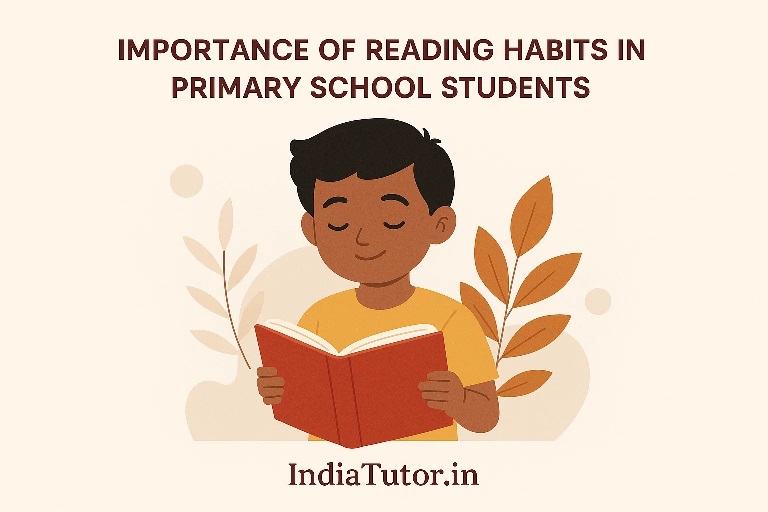Reading is one of the most important skills a child can develop during the primary school years. It not only helps students perform well academically but also shapes their overall personality, creativity, and thinking ability. As parents and educators, encouraging reading habits early in life can make a big difference in a child’s future.
Why Reading is So Important
Reading in the early years lays the foundation for success in school and beyond. According to a report by the National Reading Panel, children who develop strong reading skills by the age of 8 are more likely to do well in all subjects later. Reading improves vocabulary, comprehension, grammar, and overall communication skills.
Reading also strengthens concentration, patience, and imagination. When children read, they explore new worlds, learn about different cultures, and begin to think critically about what they see and hear.
Key Benefits of Reading Habits in Primary Students
Improves Academic Performance
A study published by the Institute of Education in the UK found that students who read for pleasure every day performed better in reading, vocabulary, and even mathematics. It shows that reading helps in multiple subjects, not just language.Boosts Vocabulary and Language Skills
Children who read regularly are exposed to a larger number of words compared to those who don’t. This naturally improves their vocabulary, sentence structure, and confidence in speaking and writing.Enhances Imagination and Creativity
Storybooks and fiction stimulate imagination. Kids who read are better at storytelling, drawing, and creating their own ideas. For example, reading about jungle animals or magical kingdoms can inspire them to write their own stories or paint vivid pictures.Builds Focus and Discipline
Reading requires children to sit still, focus, and follow a story from beginning to end. This builds patience and the ability to concentrate — skills that help in all aspects of learning.Develops Empathy and Emotional Intelligence
Books help children understand feelings, relationships, and situations from other people’s perspectives. Stories about friendship, family, loss, or success help children relate to emotions and become more sensitive and thoughtful individuals.Reduces Screen Time
In today’s digital world, children often spend hours on screens. Reading physical books or even digital stories offers a healthy alternative and helps protect their eyes, posture, and mental well-being.
Surprising Facts and Latest Research
According to Scholastic’s Kids & Family Reading Report (India Edition), 92 percent of children aged 6 to 17 agree that they enjoy books that make them laugh, and 82 percent say they enjoy books with characters they can relate to. This tells us that relatable and fun content is key to getting children interested in reading.
A UNESCO study found that if all students in low-income countries left school with basic reading skills, 171 million people could be lifted out of poverty. That’s the power of reading.
A 2022 study published in Frontiers in Psychology observed that children who were read to every day by their parents or teachers had stronger memory and better cognitive development compared to others.
Tips for Parents and Teachers
Start Early
Begin reading to children as early as possible. Even toddlers enjoy listening to simple stories. This builds a bond and sets the reading habit early.Let Them Choose
Give children the freedom to pick the books they want to read — whether it’s comics, animal stories, mysteries, or fairy tales. When children choose their books, they are more likely to enjoy and finish them.Create a Reading Corner
Set up a small, cozy reading space at home or in class. A quiet and comfortable environment encourages regular reading.Be a Role Model
Children imitate adults. If they see parents and teachers enjoying books, they are likely to do the same.Use Libraries and Book Fairs
Visiting libraries or book fairs can make reading exciting. Encourage your child to borrow or buy books regularly.Set Reading Time
Have a fixed reading time daily — even 20 minutes before bed can work wonders.
Real-Life Example
In our experience at IndiaTutor.in, tutors who read with their students as part of their lessons have seen noticeable improvement in the child’s confidence and curiosity. One of our Class 4 students, Riya, started reading one storybook per week. In six months, her vocabulary and grammar improved so much that she started writing her own short stories.
My Thoughts
Reading is not just a subject — it is a habit that builds a strong foundation for lifelong learning. The earlier a child develops this habit, the better their chances of success, not just in school, but in life. As parents, teachers, and tutors, let’s invest in this simple yet powerful habit to shape brighter futures.
At IndiaTutor.in, we encourage reading habits through our one-on-one sessions with trained tutors who use stories, poems, and fun activities to make reading enjoyable. Explore our platform to connect with tutors who can help your child fall in love with reading.
By Nidhi Mehta, Founder – IndiaTutor.in

